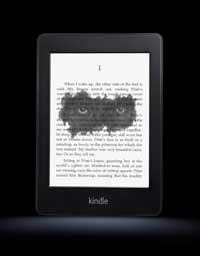Is Amazon becoming just a little sinister?
Amazon is becoming more transparent about how much it knows about you. Helpful or creepy?

Your Kindle is watching you
Last night I downloaded a sample of Jon Ronson’s Lost at Sea on my new Kindle Paperwhite. I read my free 10 per cent and liked it. When asked at the end of the sample what I’d like to do next, I clicked to buy the book. Then something new happened.
Previously, buying the book would have resulted in the full book downloading and sitting on the Kindle in addition to the sample. It was a small irritation that I had to manually delete the sample. Not anymore. Amazon has taken the logical leap that, if you’ve got 100 per cent of the book, you don’t need an additional copy of the first 10 per cent. Poof! The sample disappeared.
Another minor irritation has always been that the full book would open at the beginning, requiring one to skip forward to the point where the sample had ended, which in a long book could be quite a lot of clicking. Not anymore. The full copy of Lost at Sea opened to the paragraph at which the sample had left off because Amazon knows I’ve already read that much.
I found this helpful but at the same time a little sinister.
It’s as if Amazon is following the plotline of one of those novels where a solicitous and helpful new “friend” learns more and more about a person’s hopes, dreams, fears and needs. Over time the friend uses that knowledge to put the other person into their thrall until eventually they’re unable to do anything for themselves.
I exaggerate perhaps but last night’s experience was a reminder that Amazon is standing over my shoulder when I read, something I wrote about in Are online bookshops giving traditional publishers an unfair advantage?, following the Wall Street Journal‘s report on the data about us that Amazon is amassing and sharing with (traditional) publishers.
Our librarians and booksellers have always known plenty about our reading habits, but we expected them to exercise a priestly discretion about it. And what they knew is nothing compared to what Amazon knows, which it turns out, as the WSJ reports, it has no intention of keeping to itself.
We don’t like it when we read that law enforcement is looking at library records to try to draw conclusions about readers and their motives, and when I’ve written, myself, about the data I have about my blog readers, at least one person found it “creepy”. Nonetheless, we’re handing out even more data to Amazon every time we turn on our Kindles, and Amazon is not afraid to use it and share it; it’s also increasingly bold in showing us that it’s using it. Yes, it’s more convenient; and, yes, it’s quite handy to get targeting book recommendations, but it does feel a little sinister.
What do you think? How much are you willing to give up privacy in return for convenience? Or do you not see this as question of privacy at all?
Rate this post at: Is Amazon becoming just a little sinister?
Read and comment on more great content on the Taleist self-publishing blog




